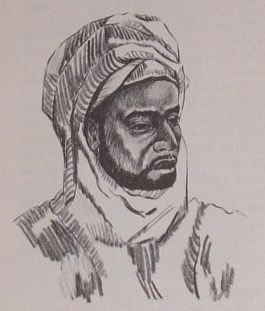Uthman dan Fodio
1754–1817
Founder of the Sokoto Caliphate
Uthman dan Fodio was an Islamic scholar and preacher who founded the Sokoto caliphate in what is now northern NIGERIA. In the 1800s Sokoto became one of the largest independent states in Africa. Born in the town of Gobir, Uthman belonged to a family of Islamic scholars. He grew up speaking Fulfulde, the language of the FULANI people, but he was educated in Arabic. At the age of 20 Uthman began preaching Islam in rural areas, later moving to the court of the sultan of Gobir. Unlike many preachers at the time, he used simple language to teach the basics of Islam to herders, farmers, and women.

By the time he was 50, Uthman had become so popular that the rulers of Gobir feared his influence. Threatened with attack, he fled Gobir for the town of Gudu where he was elected imam, or spiritual leader. He announced a jihad, or holy war, against various Muslim states that did not recognize his leadership. Over the next several years his supporters fought their way across Hausaland in northern Nigeria. By 1808 the last HAUSA city had fallen and an area of more than 200,000 square miles had been united under Uthman's leadership. Four years later Uthman divided the empire between his son, Muhammad Bello, and his brother, Abdullah dan Fodio.
In addition to his political and spiritual leadership, Uthman wrote over 100 Arabic works and some 50 poems, mostly in Fulfulde. He had 37 children, many of whom became religious leaders and scholars. His daughter Nana ASMA'U was a noted poet and a pioneer in educating women. (See also Islam in Africa.)